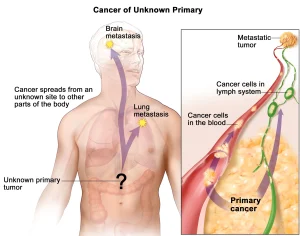Overview
Diagnosis
Carcinoma of Unknown Primary (CUP) is a type of cancer in which the primary tumor site cannot be identified at the time of diagnosis. Diagnosis usually begins after cancer is found in a secondary location, such as lymph nodes, liver, lungs, or bones.
Common diagnostic steps include:
-
Medical history and physical exam: Reviewing symptoms, risk factors, and overall health
-
Imaging studies: CT scan, MRI, PET scan, or ultrasound to locate tumors and assess spread
-
Biopsy: Tissue sample taken from a metastatic site for microscopic analysis
-
Immunohistochemistry tests: Identify tissue markers that may indicate the original cancer type
-
Molecular profiling and genetic tests: Help suggest potential origin and guide targeted therapy
-
Blood tests: Measure tumor markers and overall organ function
Accurate diagnosis helps guide treatment, even when the primary tumor remains unknown.
Treatment
Treatment for CUP depends on the location of metastases, the tissue type, and overall patient health.
Options may include:
-
Chemotherapy: Systemic treatment to target cancer cells throughout the body
-
Targeted therapy: Medications directed at specific genetic or molecular characteristics of the tumor
-
Radiation therapy: Used to shrink tumors or relieve symptoms in specific areas
-
Surgery: Occasionally performed to remove accessible metastatic tumors
-
Palliative care: Focused on symptom management and improving quality of life
A multidisciplinary approach involving oncologists, radiologists, and other specialists is often needed for the best outcomes.
Prognosis and Monitoring
The prognosis of CUP varies based on factors such as tumor type, spread, and response to therapy. Regular follow-up is essential to:
-
Monitor treatment response with imaging and blood tests
-
Manage symptoms like pain, fatigue, and organ dysfunction
-
Adjust therapies as needed to improve quality of life
-
Detect new metastatic sites or complications early
Key Takeaway
Carcinoma of Unknown Primary is a challenging cancer type where the origin of the tumor is not identifiable. Comprehensive diagnostic testing and personalized treatment plans are critical to controlling disease progression and improving patient outcomes.
Advertisement

